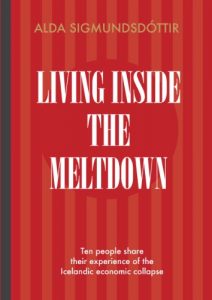In October 2008, Iceland went from being one of the wealthiest countries in the world to being one of the poorest, within the space of about two weeks. During those sensational few days, regular citizens stood by helplessly and watched as Iceland’s three large commercial banks folded and Iceland’s currency, the króna, plummeted in value, eventually becoming worthless outside of Iceland. Fear and uncertainty permeated Icelandic society during those strange days, extending to every nook and cranny of daily life. People worried whether or not they would have a job the next day, whether there would be food in the shops the following week, whether their children’s playschools would stay open, whether Iceland would retain its sovereignty, and everything else in between. Nothing was certain, and from one day to the next everything that had seemed hands-down solid seemed fleeting and unpredictable. No one was exempt. In a small nation such as Iceland it is impossible not to feel the impact of such a monumental event on your own skin. Each and every person had to completely re-assess his or her own worldview. We believed our society was virtually free of corruption and that an unwritten code of ethics was honoured by most people. Yet suddenly the veil was torn away and we saw a society rife with corruption, cronyism, incompetence and criminality – qualities most of us had associated with republics known for their banana production. Only this was our society.
Living Inside the Meltdown is the first published collection of interviews with ordinary people about Iceland’s economic meltdown. In this selection of candid interviews, ten individuals share their thoughts, feelings and experiences of living through those extraordinary days.
How did a police officer feel who had to take a stand against protesters during the ensuing political crisis, which culminated in the Kitchenware Revolution. Did he sympathize with them, or was he opposed? Did he want to join the protesters? And looking back, how does he view this time?
How did someone who worked in a bank feel going to work on the day the bank melted down? What was the atmosphere like? What was her workday like?
What about those people who were students abroad when currency controls were suddenly implemented and who were cut off from their financial source? Some of them had small children – how did they cope in a foreign country with no access to money?
What about small business owners, who suddenly had to pay for orders up front because no one trusted them? And what was it like for foreigners who lived in Iceland and who had a limited understanding of what was going on. Were they afraid? From where did they get their news?
The answers to those questions, plus many, many more, may be found in this book.
“If you take anything away from this review, let it be this: You must read this book. [...] If you are currently living through the recession (this goes for people anywhere in the world, but in particular, in Iceland), you will be able to share in the common experience of these people’s stories. [...] The book isn’t a collection of rants, nor is it an all out sob-fest, but rather gives accounts on the same topic, the collapse, each with its own story and insight.” – Iceland Review
Living Inside the Meltdown is the first published collection of interviews with ordinary people about Iceland’s economic meltdown. In this selection of candid interviews, ten individuals share their thoughts, feelings and experiences of living through those extraordinary days.
How did a police officer feel who had to take a stand against protesters during the ensuing political crisis, which culminated in the Kitchenware Revolution. Did he sympathize with them, or was he opposed? Did he want to join the protesters? And looking back, how does he view this time?
How did someone who worked in a bank feel going to work on the day the bank melted down? What was the atmosphere like? What was her workday like?
What about those people who were students abroad when currency controls were suddenly implemented and who were cut off from their financial source? Some of them had small children – how did they cope in a foreign country with no access to money?
What about small business owners, who suddenly had to pay for orders up front because no one trusted them? And what was it like for foreigners who lived in Iceland and who had a limited understanding of what was going on. Were they afraid? From where did they get their news?
The answers to those questions, plus many, many more, may be found in this book.
“If you take anything away from this review, let it be this: You must read this book. [...] If you are currently living through the recession (this goes for people anywhere in the world, but in particular, in Iceland), you will be able to share in the common experience of these people’s stories. [...] The book isn’t a collection of rants, nor is it an all out sob-fest, but rather gives accounts on the same topic, the collapse, each with its own story and insight.” – Iceland Review






